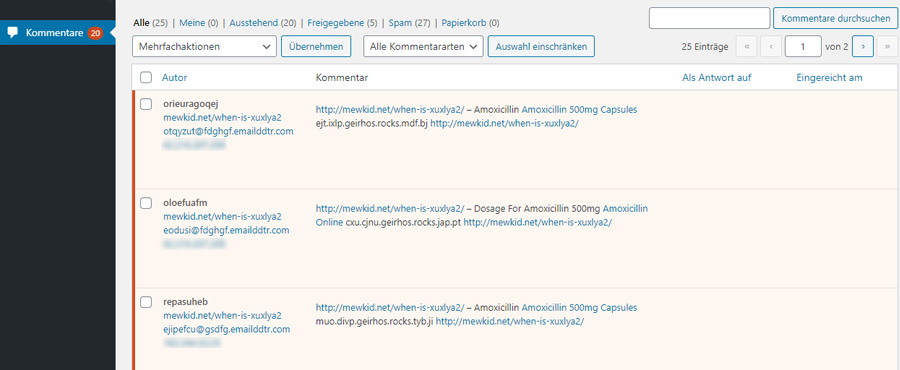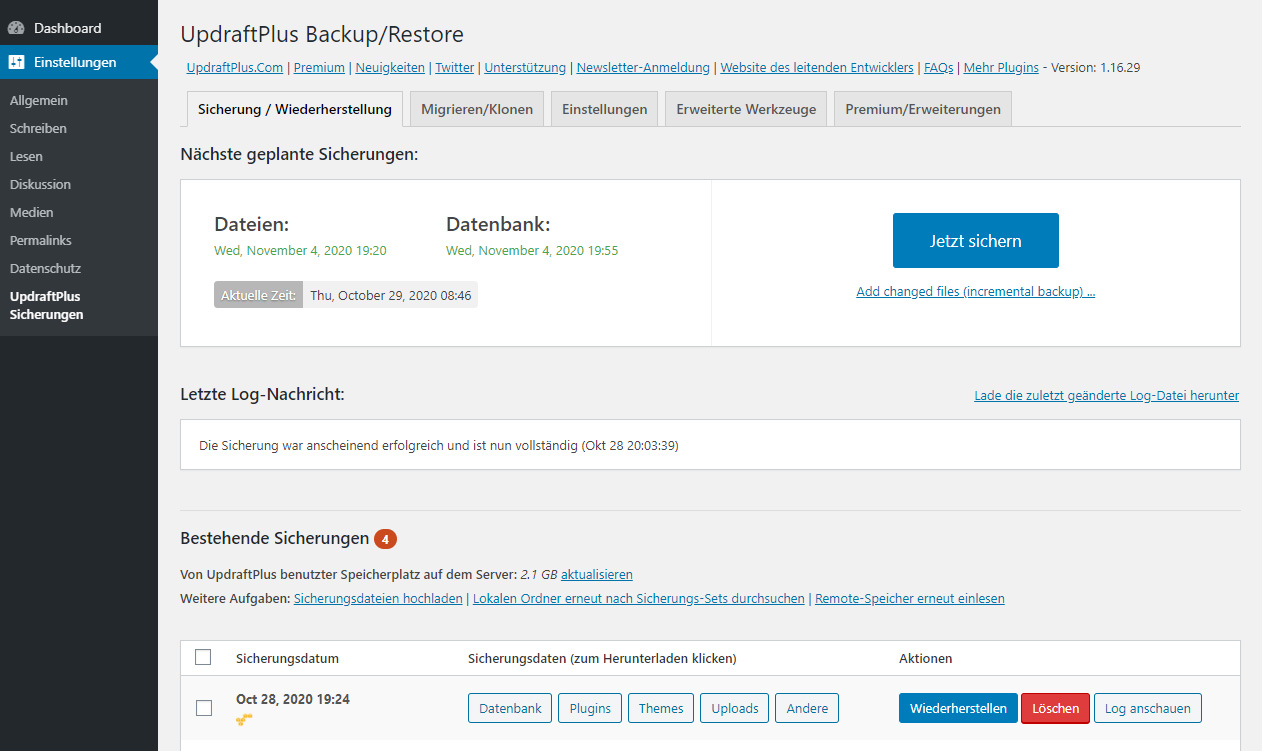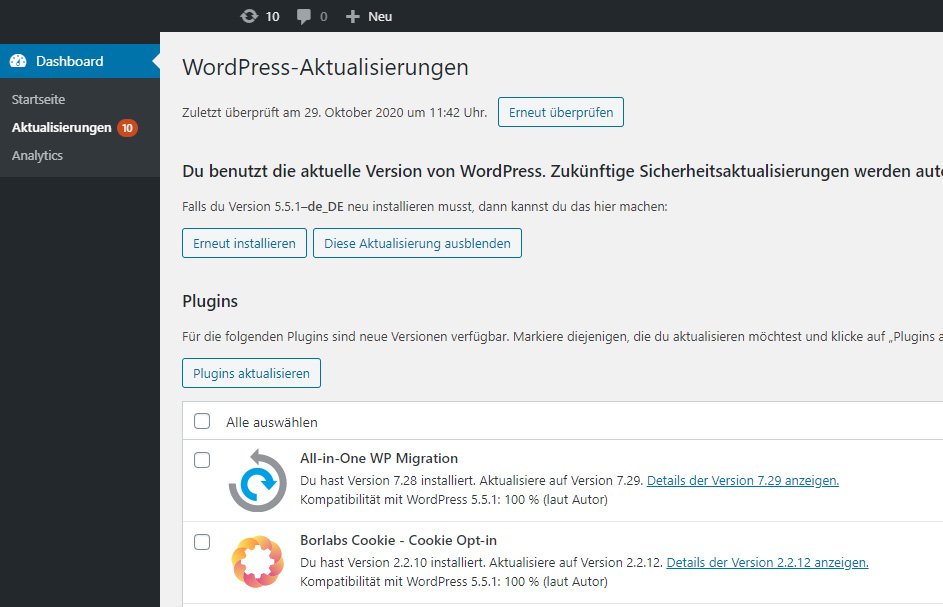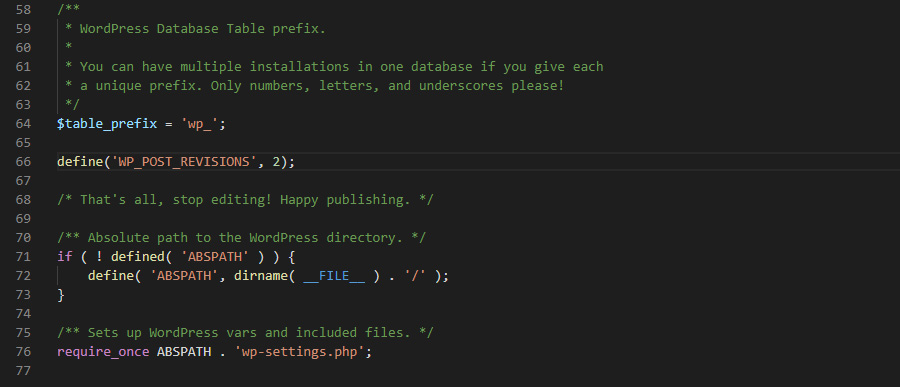
To keep your WordPress website running smoothly, you should regularly go through the following checklist. Your website is your flagship and helps you to attract customers. So it makes sense that you don't just create it and then forget about it, but keep it updated regularly. Information gets outdated quickly and with every new update you should also check the functionality of the website. Nothing is worse than a visitor turning back on his heel because your page is displayed incorrectly or content is no longer up to date. Especially in times of the data protection regulation it is very important to follow certain rules and to keep a website flawless according to legal regulations. The following list can help you to stay on the ball and not to forget any important checks. The tasks are divided into daily or weekly and monthly or quarterly. You can enter these routine tasks into your project management software or your calendar. This way you will never forget when something should be done and your website will always be up to date.
If your website has a comment section, you should check it daily to stay in touch with your customers and your community. Is the comment function still working properly? Are there new comments waiting for a response? Is there helpful feedback for your business? Especially when you're blogging, things can accumulate quickly every day. And in order not to be overwhelmed by the amount of comments, it is worthwhile to look for them every day. This also makes the commenter happy, because he gets timely answers from you. If you want to stay up to date, you can also receive email notifications for new comments.

WordPress spam comments should be deleted promptly and completely.
In addition, you should delete spam comments promptly, especially when comments are directly visible to the public without moderation. Plugins can also help here. It should be noted that some plugins, such as Jetpack, are not entirely unproblematic in terms of data protection.
Depending on how often you update your site, you should make daily/weekly/monthly backups of your entire site. It is especially useful to make these backups before you make any changes. If something goes wrong, you can always revert to the last version and nothing important will be lost. Note that you have to backup the files of your webspace as well as your database. There are now plugins that do both for you. There are also offers from web hosts, freelancers and agencies. With us, for example, customers can choose the interval according to their needs. If you are not sure whether your own web hosting provider regularly creates backups, or how to import them in case of emergency, a WordPress backup plugin is recommended in any case. Here there are already a large number of options. Currently, we like best the so-called UpdraftPlus WordPress Backup Plugin.
UpdraftPlus allows you to create backups in different ways. You can either have the backups stored directly on the web server or you can choose an external storage location. Your own web server is certainly the simplest and most uncomplicated option. However, you should bear in mind that if someone gains access to the website, they can simply delete it. Then it's "goodbye" to simple WordPress recovery. If you choose this option, you should also regularly save the backups locally so that you always have them to hand. You don't need to have too many versions "up your sleeve", after all, the most up-to-date website status is usually the most interesting.

For example, the splash screen of UpdraftPlus Backup Restore for WordPress looks like this
If you also want to make backups as secure as possible, you can choose one of the other options. In the free version, these include Dropbox, Google Drive, Amazon AWS S3, Rackspace and sending via e-mail (note that large amounts of storage are possible) in addition to the FTP variant mentioned above. With the cloud providers, you should give additional thought to data protection and check whether an AV contract is necessary.
To keep your WordPress websites running smoothly and secure, you should check at least once a week if there are new updates (WP Core, Themes, Plugins, Translations). Mostly bugs are fixed or security holes are closed, sometimes completely new information is added. Remember to make a backup before you install the updates. In addition, it makes sense to have access via FTP ready, as this is usually the fastest way to make the site functional again after a failed update.

WordPress update overview: listing of possible updates
Post revisions are the intermediate statuses that are saved when you write an article or create or update a page. If you are satisfied with the content and don't need these revisions anymore, you can simply delete them. This makes your database lighter again and WordPress doesn't have unnecessary ballast. Depending on how often you write or change something, you can do this daily or once a week. For example, if you publish only 1 to 2 blog articles per week, it should be enough if you check these revisions once a week and delete them if necessary. The deletion is probably easiest for the normal user via plugin. You can use WP-Sweep, WP-Optimize or also WP Rocket use
If you want to limit the number of revisions in advance, you just need to add the following line of code in wp-configs.php:
define('WP_POST_REVISIONS', 2);
Above code would limit the number to 2 revisions per page/article. The code must be inserted via "ABSPATH":

Example of limitation to 2 revisions
The security check is one of the most important check-ups that you should perform at least monthly. Maybe authors have been added to the system or others are no longer part of the company. For example, ask yourself if your passwords are still secure or if you need to update them. Do you have a lot of spam or does the spam filter still work properly? Were there any reports of attacks in the system? Also check if plugins still meet current security standards or if they should be replaced by other comparable ones. In addition, your database and your website environment (server / web space) should be checked for suspicious / malicious files or changed system files. There are various ways to proceed in a targeted manner. For most cases, a security plugin such as Sucuri, Wordfence, iThemes Security and similar. However, the issue of data protection should be taken into account here as a matter of urgency. Many plugins store IP addresses and communicate with central servers for protection purposes. Data protection measures and adjustments may be necessary here!
Cleaning up the database regularly will help keep your WordPress website running clean and fast. Too large databases with unnecessary information can slow down a website a lot and also make it hard for you to update content. The site crashes more easily when it has to load tons of data paths. For example, when cleaning up WP-Optimize or also WP Rocket help (do not forget to make a backup beforehand!).
Do you know this too? You are on a website and there is a link to another piece of information you really want to have, but the link doesn't work anymore or leads to nirvana? This is frustrating. If this happens frequently on your website, visitors will quickly judge your website as no longer up to date or professional. If a visitor has such an experience, you may lose him forever. Also, you want to make sure to the best of your knowledge that your links do not redirect to dubious sites and cause damage to the visitor's system. Search engines don't like such links at all (keyword search engine optimization!). If you don't want to do the check manually, you can use web-based SEO audit tools (SEMrush, Ahrefs, SEranking, etc.). But also the Google Search Console offers a good overview here. There are also WordPress plugins for checking broken links, but in our opinion, this only adds unnecessary ballast to your website in the form of another plugin.
If you use forms on your website, it is recommended to test them once a month or at least once a quarter. Does the content still arrive? Do the buttons work? Is the content still up to date or are there new features that need to be added? That way, you won't miss any customer requests or feedback.
The design and all visual components of your website should be reviewed regularly. It is important that visitors can use your website without problems and that the navigation is comprehensible. If visitors can't find their way around your website or if only small error icons are displayed instead of images, you will lose potential new customers. Your website does not look very professional and this reflects badly on your brand and your company. Sounds drastic, but the first impression counts. But maybe you realize that you don't really like the design anymore and you want to change something.
Once a quarter you should check if you still need certain plugins or if you can delete them. Sometimes you try out different plugins, only to somehow have a preference for a particular one. Too many plugins are also often negatively evaluated by search engines and can unnecessarily inflate the code of the website. In the worst case, this can also have a negative impact on the loading time of your website. Especially for visitors with slow connections it is then particularly difficult to see your content. Search engines like Google are aware of this fact, which is why page load time is an important ranking factor.
As already mentioned at the beginning, there have been particularly strict guidelines regarding data protection and imprint requirements since May. Therefore, you should regularly check whether everything is still up to date. Have you moved? Has your company name changed? Do you use new software for data processing? Incorrect or incomplete information can be very expensive if it is reported. But you can also renew information like references or publish new information about the company itself. Maybe you won a well-known award and want to share that. Or you have new testimonials that could be helpful to convince visitors of your service. In the area of privacy policy, a subscription service can be useful, as it keeps the privacy policy always up to date. For WordPress, for example, there are suitable legal texts at the IT law firm from Munich.
The insights from analytics and search queries are very helpful for your content and offer. You can use the data to optimize your service or provide the content that can help your visitors the most. You learn a lot about your target audience and can also see where there might be errors on your website. For example, you can see where people leave your site the most and then optimize this area so that visitors stay longer on your site and get to know your service better.
As you can see, it's important to routinely take care of your WordPress website so that everything runs smoothly and visitors and customers get a good impression of you and your business. This also makes it easier to attract customers and grow your business.
In our agency we work with WordPress, as this system is one of the most reliable and modern CMS systems on the market. It is easy and intuitive to use and meets the latest standards of technology. In addition, WordPress is constantly being developed and improved. Maintenance and care of your website are clear and easy to do. WordPress is also free and can be extended by numerous plugins and adapted exactly to your needs. You can optimize a website based on WordPress also wonderful for search engines. So you spend less time with SEO and more with helpful content for your target audience,
We're happy to help you design and maintain your WordPress website so you can focus on the content. There are several packages to choose from and you can select exactly what you need. For example, we do backups, security checks, analyze your statistics and take care of the maintenance of your database. We can do that and much more for you, so you have more time for your customers. Here you can find our WordPress maintenance and service plans - If you have any questions, please feel free to contact us. We are an agency with a passion for good design, a lot of know-how and you also get great coffee with us. We'd love to hear from you to find out how we can best support you and your business.
(last updated October 29, 2020)
Sebastian Lochbronner
86830 Schwabmünchen
Germany